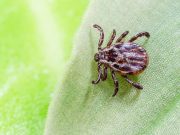Tag: Allergies: Food
Expanded Use of Xolair to Treat Food Allergies Approved by the FDA
Xolair is not meant to substitute for emergency anaphylaxis medications such as the EpiPen
ACAAI: Parents, Patients Offer Theories on Causes/Origins of Food Allergies
Parents and adult patients with food allergy believe diet, genetics, family history, infection are linked to food allergy development
Sublingual Immunotherapy Safe, Effective for Treating Toddlers’ Peanut Allergy
Improved outcomes seen with younger age at initiation
Gut Microbiome May Predict Later Peanut Allergies
Infants who eventually developed peanut allergies had lower gut microbiome diversity during their early years
Peanut Oral Immunotherapy Effective for Children Under 12 Months
OIT can safely induce desensitization to peanuts in children younger than 12 months of age
Even Transient Food Allergy in Infancy Impacts Later Lung Function
For allergies at age 1 year, lung function deficits and asthma seen at 6 years
More Parents Are Introducing Peanuts Early
Guideline awareness and primary care provider encouragement are significant drivers of early introduction
Provider Awareness and Knowledge of Alpha-Gal Syndrome Limited
Suspected cases mainly occur in counties within the Southern, Midwestern, and Mid-Atlantic U.S. Census Bureau regions
Maternal Egg Consumption Not Tied to Egg Allergy in Offspring
Findings for randomized trial of consumption in early neonatal period and allergy development at 12 months
Higher Prevalence of Food Allergies Among Racial, Ethnic Minorities
Higher prevalence among Asian, Hispanic, non-Hispanic Black versus non-Hispanic White individuals














